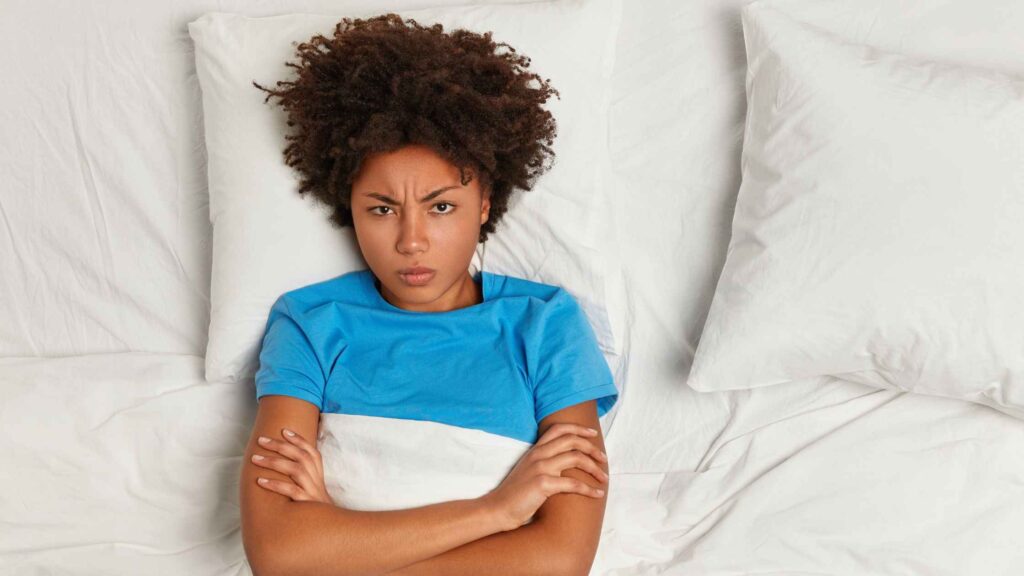Insomnia, nocturnal awakenings, sleep problems, what to do? Experiencing sleep problems is a fairly common phenomenon for everyone.
But if these problems become recurrent, health can be affected, and daily life becomes more and more difficult over time.
When we sleep, the muscles are not solicited. The different limbs of the body relax, and muscular tension is naturally evacuated.
It contributes to the proper functioning of the immune system, which is essential to fight against infections.
Our brain will take advantage of muscle rest to rebuild and solidify the cells of the skin, bones, and muscles.
Also read: How To Improve Your Sleep Hygiene?
Let’s dive in.
The Different Pathologies
Insomnia
This is the pathology most commonly observed in patients with sleep disorders. Nearly 1 in 10 French people suffer from insomnia every night.
This is manifested by poor quality sleep, slow falling asleep, several awakenings during the night… Depression, digestive disorders, and asthma can cause recurrent insomnia.
Restless Leg Syndrome
Increasingly common, restless leg syndrome results in unconscious movements and pain in the legs during sleep.
Lack of activity can lead to this problem, so it is advisable to have regular physical activity and go to bed when you sleep, and not before.
Sleep Apnea
This pathology is often observed in people over 50, although it is possible in younger people. Repeated respiratory arrests throughout the night are a symptom of it.
Stops lead to micro-awakenings that disrupt sleep and cause cardiovascular stress. Drowsiness, memory problems, attention issues, and mood disorders are signs of sleep apnea during the day.
This sleep pathology can come from weight gain, excess alcohol or medication, hypertension, or cardiovascular problems.
Hypersomnia
An abnormally long sleep period or recurrent falling asleep (known as narcolepsy), which may be a result of sleep regulation disorders, are symptoms of this pathology.
Hypersomnia can be treated with medication or sleep rehabilitation exercises.
The Best Natural Solutions
The Weighted Blankets
Weighted blankets are a safe and effective solution to treating insomnia.
Studies have shown that patients with insomnia and psychiatric disorders had less severe insomnia, better sleep, and less daytime sleepiness when they slept with a weighted chain blanket.
Being more aware of our body due to this light pressure exerted on it, our emotions no longer take over.
Our mind calms down, the body relaxes and opens the door to falling asleep faster while reducing insomnia.
Sleeping with a heavy blanket encourages deep touch pressure stimulation, also known as DTPS (deep touch pressure stimulation).
The key to this stimulation is the heaviness of the blanket, which can create full body pressure.
Pillow Mist
Thanks to precise mixtures, these essences promote sleep by allowing the body and mind an almost immediate relaxation, thanks in particular to aromatherapy.
Indeed, some essential oils have soothing properties that are real allies for better sleep.
We find in particular the essential oil of lavender, but also certain essential oils of citrus fruits, or even the essential oil of basil, a real bulwark against anxiety.
These mists allow you to enter a serene, calm environment and accelerate the process of falling asleep Thanks.
A more restful and deep sleep follows for the whole night… The best is to spray the mist 15 minutes before going to bed.
You can also spray your interior with it every day to create a zen and serene atmosphere.
Massage Oil
To relieve stress, regain good sleep, and have a good night’s sleep, massage can be a solution to help you fall asleep.
A good relaxing massage acts on the brain. It solicits the dermis and stimulates the production of endorphins and serotonin, the hormones of pleasure and relief.
Before proceeding to a wellness massage, take a hot bath or shower for total muscle relaxation.
It is possible to choose a massage oil adapted to your desires and needs from a wide range composed of different synergies and benefits.
The Sleep Diary
Completing a sleep diary allows you to analyze the quality of your sleep over a longer or shorter period of time.
The idea is to last at least two weeks to gain the necessary perspective and be able to analyze and point out your problems.
If you have sleep problems or unexplained fatigue during the day, analyze your daily habits to identify what is wrong.
The journal will allow you to have a summary of good or bad habits for your sleep.
10 Tips To Sleep Better
- Keep your room cool and completely dark
- Stop caffeine and any other energy drinks after 4 p.m.
- Exercise regularly
- Set fixed sleep and wake-up times
- Take a hot bath before going to bed
- Enjoy at least 30 minutes per day of natural light
- Will not reschedule your alarm for later
- Avoid drinking alcohol in the evening
- Do breathing exercises
- Better understand your nights thanks to sleep cycles.
Everything you need to know about the link between diet and sleep.

